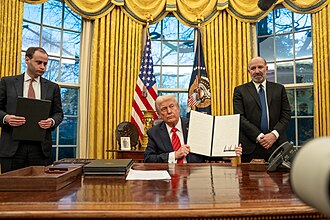By T N Ashok
NEW YORK: It’s a telephone call that US President Donald Trump has been waiting for endlessly over the last 48 hours, waiting for the Chinese supremo president Xi Jinping to call and negotiate the 145% tariffs he has imposed on the red country in a battle of wits and ego trips unsurpassed in history of a clash between two global leaders wanting to assert their supremacy over each other and display their might and power and arrogance.
While diplomats claim that Xi Jinping is too proud a man to cow down and call Trump, others say he has told insiders in his party that he would like to go halfway expecting the American president to do the same to talk it out.
A tariff reprieve from President Donald Trump sent global markets soaring on Wednesday, with the White House saying it’s been in touch with dozens of countries about striking deals, lining up calls and meetings in the coming weeks. White House claimed that 15 countries were falling in line with the 90-day halt and were willing to come to the negotiating table.
As the rest of the world received a 90-day respite, Trump escalated tariffs on China, saying the US will now charge an extra 145% on all Chinese goods that arrive in the US. In response, Beijing moved to exact pain on a strategic US industry by limiting the export of American movies, after already hiking its own tariffs on the US to 84%, US media commentators said.
An unprecedented trade war between the world’s two economic superpowers is quickly taking shape, with both countries waiting for the other to blink. Neither is batting an eyelid. Two senior White House officials told the US media network CNN that the US will not reach out to China first. Trump has told his team that China must be the first to make the move, as the White House believes it is Beijing that has chosen to retaliate and further escalate the trade war. Now it’s not so much a trade war rather than a clash of inflated egos on both sides.
Trump’s stoic stance has been conveyed to Beijing for roughly two months, with his team clearly telling Chinese officials that President Xi Jinping should request a call with Trump. But Beijing has repeatedly refused to arrange a leader-level phone call, according to some sources familiar with the official communications.
One hurdle, Trump’s team believes, is Xi’s desire not to be seen as weak by making the first move and approaching the US for talks. Trump, who envisions a grand bargain with China that increases US exports, cracks down on fentanyl exports and restructures TikTok for US users, has suggested Beijing would come around, US media reports suggested.
“China wants to make a deal. They just don’t know how quite to go about it,” Trump said on Wednesday during an event at the White House. “You know, it’s one of those things they don’t know quite – They’re proud people.”
But for months, US and Chinese leaders have been talking past each other, allowing relations to sour as each country’s overtures went unanswered. Behind the scenes, official channels at the working level are active, but high-level dialogue has not been happening. Meanwhile, unofficial channels have proven unproductive, according to three sources briefed on the situation, paving the way for a game of economic chicken with a costly and uncertain end.
China’s reliance on strict protocol and desire to prepare Xi for any call of this magnitude is fundamentally at odds with how Trump does business, some current and former officials say, which they point to as the main hangup in trying to get productive talks underway.
China has been trying to set up a back channel, like it had with President Joe Biden’s national security adviser, Jake Sullivan, but so far that effort has been unsuccessful. The US objection, according to officials: The Trump administration has balked at China’s Foreign Minister Wang Yi serving as the interlocutor, suggesting that Wang is not close enough to Xi’s inner circle and cannot be trusted.
Chinese officials have been presented with the specific names of people that the Trump White House would like to engage with instead, but China won’t budge, sources say. Further inflaming tensions, the Chinese readout of a call between Wang and Secretary of State Marco Rubio earlier this year appeared to misrepresent the contents of the call, Rubio later said. “That didn’t happen, at least not on the call, or at least maybe their interpreter didn’t want to interpret it that way,” Rubio said of the Chinese claim that Rubio was warned not to overstep himself.
While some communication between the sides has been brokered by China’s ambassador to the US, the dearth of a principal-level channel has been problematic in arranging a call that the Trump administration says is necessary. Two senior White House officials told CNN that Trump would be happy for communication to begin below the leader-level if it brought about results.
Donald Trump claims he’d “love to make a deal with China” as tariff rises to Despite US govt. officials publicly saying that Trump will dictate his engagement with Xi – National Economic Council Director Kevin Hassett said on CNBC Thursday morning that Trump “will decide” when conversations begin – it is clear that the ball is in China’s court for the time being.
At least that’s how Trump officials see it. But that’s not the view in Beijing. “The door to talks is open, but dialogue must be conducted on the basis of mutual respect and equality,” a spokesperson for the Chinese Commerce Ministry said Thursday. “If the US chooses confrontation, China will respond in kind. Pressure, threats, and blackmail are not the right ways to deal with China.”
Amid the standoff, the White House has sought to prioritize trade deals with Japan, South Korea and Vietnam in order to pressure Beijing, a senior White House official said. Current and former US officials aren’t ruling out the possibility of putting in place an unexpected preparation channel for a possible Xi-Trump call, but former US officials say the key is ensuring the Chinese they aren’t sending Xi in for an ambush — especially after the tongue-lashing Ukrainian President Volodymyr Zelensky received in the Oval Office.
“The Chinese in any case, are reluctant to put their leader in the position that Zelensky found himself in,” said Danny Russel, a former assistant secretary of State for East Asia and currently vice president of the Asian Society Policy Institute. “They want to ensure that some of the groundwork is laid for a meeting, and that there’s some ground rules established.”
Chinese officials have sought avenues to reach Trump directly, often through business leaders who have his ear. When Xi dispatched Vice President Han Zheng to Washington as the highest-ranking Chinese envoy to ever attend a presidential swearing-in, Han also took a meeting with Elon Musk.
The billionaire Tesla CEO has business in China and has also wielded enormous influence in the early days of the Trump administration. Chinese officials had hoped to establish more direct lines of communication with the new Trump administration, using Musk as an intermediary, one person familiar with the matter said. But so far, those attempts haven’t been fruitful.
China has considered kneecapping the operations of blue-chip US companies in China such as Apple, Tesla, Caterpillar and Starbucks. Ultimately, according to two sources briefed on the discussions, Beijing backed off that idea – worried that Chinese consumers would revolt, and the Chinese Communist Party could lose the potential for lucrative executive backchannels.
But the CCP is still weighing strategic options to hit back against Washington beyond simply raising import duties. China will likely begin buying soybeans and agricultural products from Brazil instead of the US heartland, as it did during Trump’s first-term trade war.
“Look at where they’re blacklisting US companies, hitting US farmers, cutting us off from critical minerals – that’s a toolkit that they’re very comfortable wielding,” said Melanie Hart, senior director of the Atlantic Council’s Global China Hub. “They have experimented with it in many other countries. They’ve been developing it for years. They have a bunker that they’ve been building for this moment.”
What is the threshold of pain each country is willing to bear? None in diplomatic circles or business circles could fathom a guess. But one thing is clear: How far either country moves into leveraging non-tariff weapons to fight back could determine how dangerous the economic conflict could become. Beijing has banned the export of a handful of rare earth minerals required for manufacturing certain goods. Moving to ban the export of all rare earth minerals or selling off the mountain of US Treasury bonds it’s amassed would be seen as taking the conflict to the next level.
When markets crash, investors run to buy or secure their investments in US treasury bonds. But this time amid the tariff wars between China and USA, investors created panic selling not only stocks but also treasury bonds. China holds a enormous amount of $770 billion in US treasury bonds – if Xi Jinping decides to dump it in the market, which he will not, as he will be the loser, but it could be the ultimate weapon to crash the US economy.
“If China moves to fully throttle the US economy, all shackles are off,” said a former US official briefed on the state of play. “A trade war of that magnitude is an act of war.” Which country has more leverage in such a conflict depends on who you ask. Peter Navarro, Trump’s uber-hawk, has suggested Beijing can’t afford to escalate to that level. Others suggest that’s a naive depiction of an authoritarian leader wielding the full power of a non-market economy subsidized by his government, media analysts in the US said. It is a full scale war of attrition between Donald Trump and Xi Jinping on Tariffs. (IPA Service)

 Narendra Modi’s 2011 Tweet About Rana Is Back In Circulation To Prop PM’s Image
Narendra Modi’s 2011 Tweet About Rana Is Back In Circulation To Prop PM’s Image 